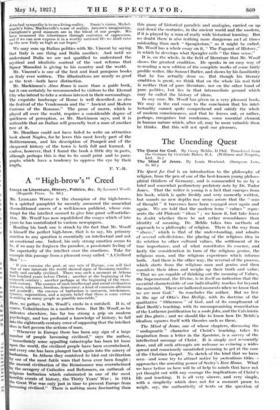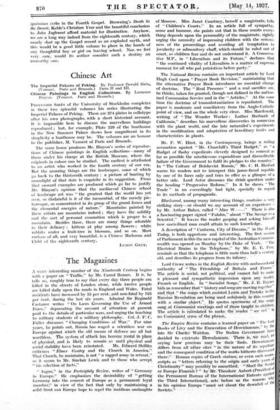The Unending Quest
The Mind of Jesus. By Louis Howland. (Sampson Low. . 3s. 6d.)
The Quest for God is an introduction to the philosophy of religion, from the pen of one of the best-known young philoso- phical thinkers of Germany, and is commended to us by a brief and somewhat perfunctory prefatory note by Dr. Tudor Jones. That the writer is young is a fact that emerges from his book, which is quite freshly and very earnestly written, but sounds no new depths nor seems aware that the " seas of thought 7 it traverses have been voyaged over 'again and again. We are told that the modern term " values " repre- sents the old Platonic " ideas " ; we know it, but take leave to doubt whether there be not rather resemblance than identity of meaning. Dr. 3fehlis takes two methods of approach to a philosophy of religion. There is the way from " above," which is that of the understanding, and admits of several sub-divisions, the placing of the religious idea in its relation to other cultural values, the settlement of its true importance, and of what constitutes its essence, and lastly the consideration in turn of the religious genius, the religious man, and the religious experience which informs both. And there is the other way, the reversal of the process, which starts from the religious man and genius and then considers their ideas and weighs up their truth: and value.
" That we are capable of thinking out the meaning of Values; the Supernatural, the Divine, is in itself an indication that the
essential characteristic of our individuality reaches -far beyond the material. There arc hallowed moments when we know that we are near God." So concludes the author. But we live in the age of Otto's Das Heilige, with its doctrine of the qualitative " Otherness " of God, and of its complement of Karl Barth's teaching, with its uncompromising resuseitation of the Lutheran justification by a nude fides, and the Calvinistic soli Deo gloria ;- and we should like to know how Dr. Mehlis's idealism smiareS itself with theOries such'as these.
The Mind of Jesus, one of whose chapters, discussing the " undogmatie " character Of Christ's' teaching, takes its inspiration from a letter in the Spectator, is a survey of the- intellectUal message of Christ. It is simply and reverently done, and all such attempts are welcome as evincing a iricle.r. Spread and consciously unsatisfied yearning to get at the core of the Christian Gospel.' No--sketch of the kind that wo have Seen–and some try -ha attract notice by :s.4etentiotia titles-z4 apprOaches the arresting power of Seeley's Ecee Mono. What we have befOre us' here will be of help to minds that have not yet thought out with any courage the implications of Christ's life and teaching. It is all very sincere, and very simple, with a simplicity which does not for a moment pause. to weigh, say, the authenticity of texts or the question of ipsissinta rerba in the Fourth Gospel. Browning's Death in the Desert, Keble's Christian Year and the beautiful conclusion to John ltglesant afford material for illustration. Anyhow, we are a long way indeed from the eighteenth century, which nearly shut up the Gospel record as an exploded myth, and this would be a good little volume to place in the hands of any thoughtful boy or girl on leaving school. Nor, we feel very . sure, would its author consider such a destiny an unworthy one.



























































 Previous page
Previous page